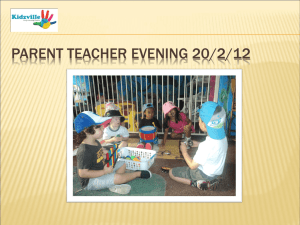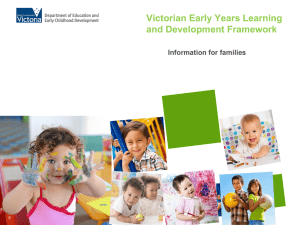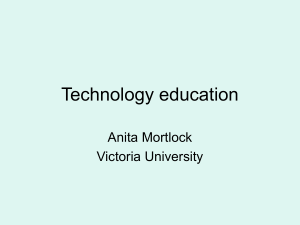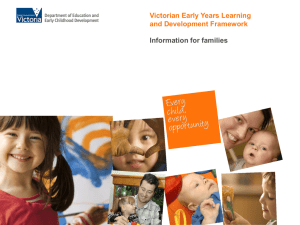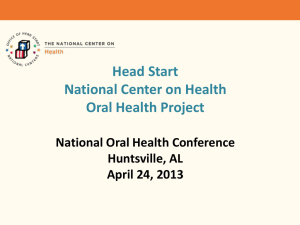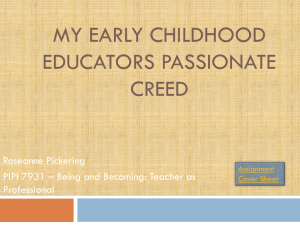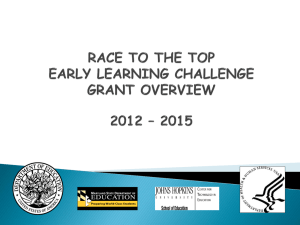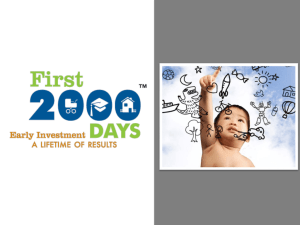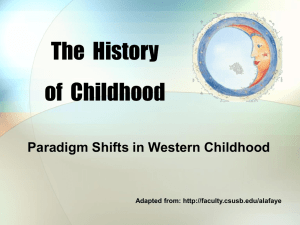Chapter 4
advertisement
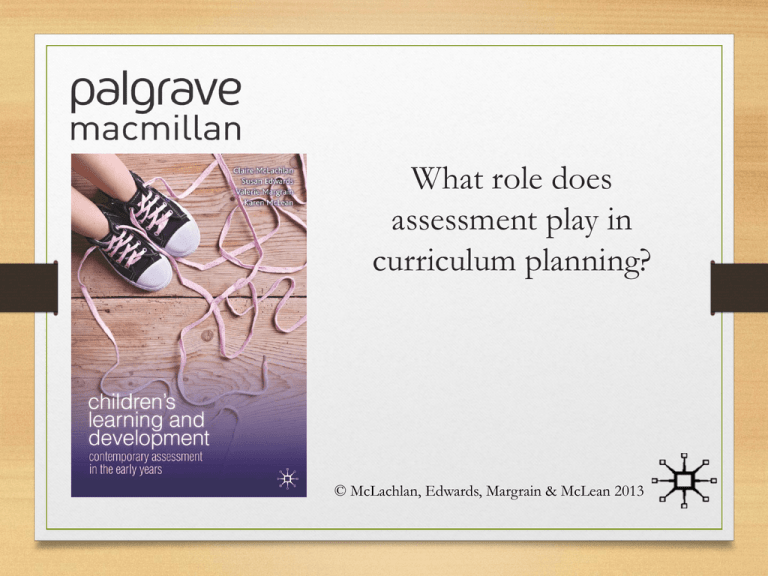
What role does assessment play in curriculum planning? © McLachlan, Edwards, Margrain & McLean 2013 Assessment and curriculum planning • Teachers can and should draw on a range of assessment practices to inform curriculum planning • There are a range of factors that influence the way teachers think about curriculum the enacted curriculum, or, what teachers do and their classroom is, varies considerably due to the way these factors come together for each individual teacher (Blaise and Nuttall 2011). The influence of policy on curriculum • Whilst curriculum is commonly referred to as “the content of teaching” (Bowman, Donovan & Burns 2001, p. 182) pedagogy is described as the how and what of teaching, or, “knowledge about how to teach so that children will learn” (Comber & Reid 2007 p. 45) • Policy is embedded within curriculum frameworks Example of curriculum descriptions and definitions in two curriculum documents Australian Early Years Learning Framework Te Whāriki - The New Zealand Curriculum In the early childhood setting curriculum means ‘all the interactions, experiences, activities, routines and events, planned and unplanned, that occur in an environment designed to foster children’s learning and developments’ (adapted from Te Whāriki ). (Department of Education, Employment and Workforce Relations 2009, p. 9) The term ‘curriculum’ is used in this document to describe the sum total of the experiences, activities, and events, whether direct or indirect, which occur within an environment designed to foster children’s learning and development. (Ministry of Education 1996, p. 10) The relationship between the assessment and curriculum planning cycle • A key purpose for assessment is to support children’s learning and development • Ongoing assessment processes should provide validation of the different pathways that children take to reach learning outcomes Assessment and curriculum planning cycle • Culturally and linguistically supportive assessment practices should be implemented. • These include: • identifying what each child brings to the learning context and ensuring curriculum and pedagogical decisions are aimed at fostering further learning and development • incorporating a variety of assessment practices • identifying and using children’s prior knowledge to plan an appropriate curriculum • engaging in an ongoing cycle aimed at gathering, analysing and using information to support children’s learning and development, and strengthen curriculum. Assessment for learning • The process of documenting learning and development is • • • • closely linked to contemporary views of assessment for learning Assessment for learning processes are aimed at providing information for teachers to plan for children’s learning In curriculum documentation there is a further emphasis on determining individual progress towards learning outcomes, essential skills or standards Assessment contributes to what children can learn and do, and to pedagogy Learning occurs when a synergy between assessment, curriculum and pedagogy is realised Assessment for learning • Variation occurs in the interpretation and application of policies to early childhood settings • The EYLF identifies three levels for planning, facilitating and monitoring learning • Overarching outcomes of being, belonging and becoming • Five learning outcomes and 19 sub elements • Points of evidence • All three levels of outcomes should be used to plan curriculum Guidance on assessment to support curriculum documents A range of weblinks are provided to support teachers to implement assessment. These include: • Ministry of Education Early Childhood Education New Zealand • Outlines assessment for learning • Narrative assessment exemplars • Small case studies • National standards • Topics to contribute to learning outcomes • Ministry of Education research documents Guidance on assessment to support curriculum documents • Ministry of Education Inclusive Education • Narrative assessment • Exemplars • Case studies • Department of Education and Workplace Relations • Childcare • Pre-School Guidance on assessment to support curriculum documents • Early Childhood Australia • National Quality Standards • Publications and research • Newsletter • Position statement • Victorian Curriculum and Assessment Authority (VCAA) • Victorian Early Years Learning Exchange • Publications, Research and Presentations • Activities for good practice • Victorian Early Years Learning and Development Framework(VEYLDF), Early Years Learning Framework (EYLF), Victorian Essential Learning Standards (VELS) and Assessment Resources Holistic assessment practices • • • • Te Whāriki and EYLF • socio-cultural perspectives deeply embedded • intentional teaching Holistic approaches to assessment recognise that all learners learn different things at different times and in different ways (Carr & Lee 2012; ERO 2008; Ministry of Education 2009) Take into consideration child’s learning within and across a range of domains: • physical • spiritual • wellbeing • emotional • personal • cognitive • social Teachers being attentive to children’s learning and development through observing, actively listening, documenting and discussing children’s learning Assessment practices should • Challenge early years teachers to improve teaching and learning • Support and build upon existing strengths • Credit based or strength based models of assessment are holistic and highlight connections between child, activity and community (Carr 2001) Assessment for learning • Assessment for learning in Australian and New Zealand curriculum documents is part of a wider international interest in early childhood education • Ongoing process for improving quality of teaching and learning in early childhood Key terms • • • • • • • Te Whāriki – the New Zealand bicultural early childhood curriculum (Ministry of Education, New Zealand 1996). The name means ‘woven mat’ and represents the weaving of the principles, stands and goals of the curriculum to plan for children’s learning and development. Whānau – the Māori term for extended family. The term in increasingly used in official publications in New Zealand to refer to diverse family groupings. Reggio Emilia – city in northern Italy that has a world-recognised approach to early childhood education. Multiple assessment strategies – strategies for assessment that incorporate more than one form of assessment. Early childhood pedagogy – the art or science of early childhood teaching. Formative assessment – includes formal and informal assessment aimed at improving learning. Assessment for learning – ongoing assessment process aimed at informing and improving teaching and learning.
